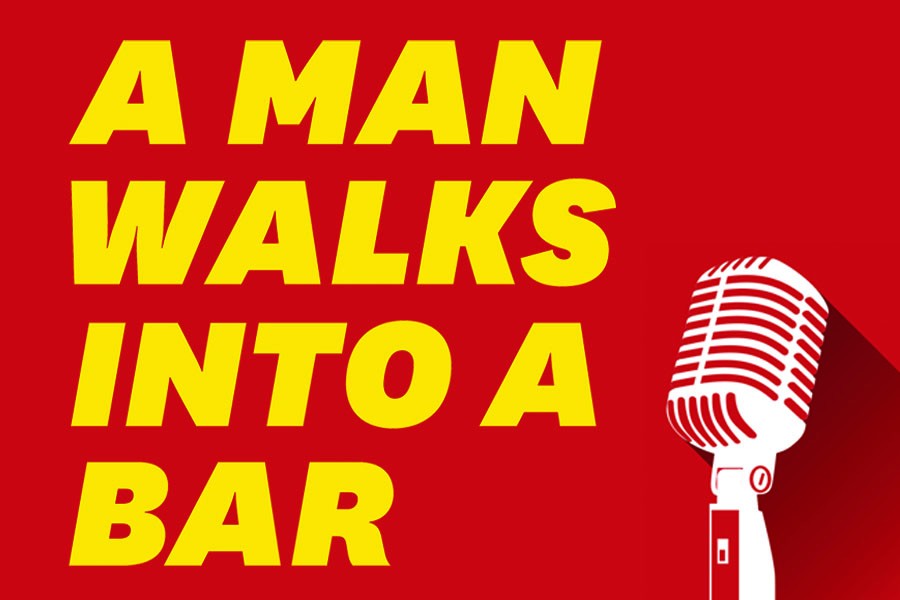Scott Rogowsky went viral in April. The actor/comedian made an online video that features him riding the New York subway while reading fake books and filming people's reactions to the dust jackets: Slut-Shaming Your Baby; Human Taxidermy: A Beginner's Guide; Gone Girl 2: Even Goner; Getting Away With Murder: For Dummies by Robert Durst.
A still image from this project began circulating through social media in mid-April, and the Fat Jew—aka social media personality Josh Ostrovsky—posted it to his Instagram feed for his 8.3 million followers. The photo showed Rogowsky reading a fake how-to book dedicated to an esoteric sexual act.
Rogowsky, A&S '07, who since 2011 has hosted a monthly live late-night talk show around New York called Running Late, says nothing he's ever done has been seen by so many people—the video alone amassed 4.5 million views by May. The photo and video led to coverage in The Guardian, newspapers in Spain and Ireland, and more than 50 websites, plus an interview with the Canadian Broadcasting Corporation. More people have seen Rogowsky from this photo/video, he reckons, than his short-lived ABC television program, Would You Fall for That? "I had that show on ABC in 2013; no one saw it," he says. "That shows you what people are watching. So while I think the dream is still to get Running Late on TV, now it might be to get it on Snapchat. Maybe that's the future."
Thing is, Rogowsky made that video for Playboy as a freelance producer, the job that has paid his bills since 2009. He's written, directed, and starred in video and podcast content for a variety of clients, including ESPN and Comedy Central, and one of his steady gigs is producing the Sklarbro Country podcast for the Sklar Brothers, twins Randy and Jason, who comically talk sports and pop culture. Running Late, Rogowsky's show, is what he self-produces while doing these other projects. He had to put it on temporary hiatus last fall when he was hired to direct a series of five-minute videos for Weird World of Sports, a program available through Verizon's streaming go90 app. He covered underwater hockey, Segway polo, chess boxing in England, extreme pogo in Barcelona, and mountain unicycling in Austria.
Welcome to comedy in the 21st century, where the possibilities for work are vast, the variety of platforms is wide, and both paying the bills and staying abreast of the industry involves juggling a number of different media and formats. All six alumni profiled here engage in some combination of writing, producing, social media marketing, and teaching projects that help support their comedic projects in writing, performing, and stand-up. That's simply the nature of the career right now.
Comedy isn't the first thing that comes to mind when thinking about the university—it might not even be the 401st thing that comes to mind. Jeff Altman, A&S '74, somehow managed to jump from Homewood to stand-up in the early 1970s when the "comedy circuit" meant performing at the Comedy Store in Hollywood, the Improv in New York, and a few smaller venues such as the Ice House in Pasadena, California, which also booked folk music acts. Altman came of comedy age during a freewheeling era that produced a who's who of comedians. And while Altman's career during the 1980s comedy boom didn't catch the big wave that his peers Ricky Jay, David Letterman, and Jerry Seinfeld rode to mainstream success, those comedians still recall his anarchic humor so fondly that Esquire called Altman "the greatest stand-up you've probably never heard of" in an August 2015 article.
More aspiring comedians have tried to make that jump from Homewood to Hollywood over the past 15 years, and the following alumni are doing their part to make comedy the 399th thing that comes to mind when thinking about Johns Hopkins.
Scott Rogowsky
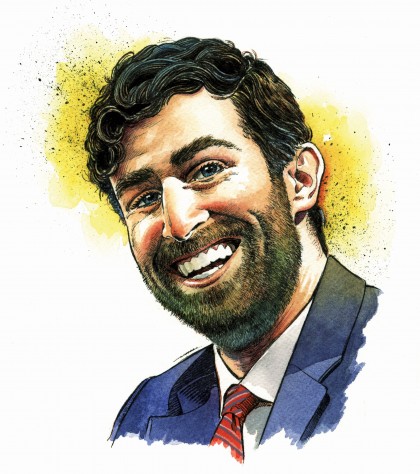
Image credit: John Kachik
He does enjoy interviewing pop culture figures with big personalities, like one of the guests from his April 2016 show, Lisa Ann. She's the fantasy sports radio personality, writer, and former adult film star infamous for portraying Sarah Palin in a series of parody adult films. Rogowsky had 45 minutes of pre-interview phone chat with her and knew she was going to be an entertaining character. "I like guests like her because she's willing to talk about anything," he says. "She can laugh about herself. She's composed and poised. And she's going to have fun."
Rogowsky's wit runs to dry with a healthy dose of self-deprecation thrown in, and his interview style on Running Late is more engaging-and-curious Johnny Carson than overzealous-and-coy Jimmy Fallon. He wants his guests to have fun, lively conversations. In December 2012, he put together an "Evening with the Elliotts" episode of Running Late and welcomed Chris Elliott, the madcap veteran comedian who used to do curveball characters on Late Show with David Letterman, and Elliott's two daughters, comedic actor Bridey and Saturday Night Live cast member Abby. Rogowsky initially interviewed Bridey and Abby and then brought out their dad, who came onstage treating Rogowsky like he was Letterman, congratulating him for his recent Kennedy Center Honor. Rogowsky cracked up and did his best to hold his own against a man who has a few decades of comedy on him.
Following a brief hiatus in the fall of 2015, Rogowsky is back to producing monthly Running Late episodes, hoping to build enough momentum to stage it weekly and generate enough of an audience to interest execs in TV—streaming, network, or cable. The show is a throwback to the leisurely, roaming talk show hosts of a different era, like Dick Cavett. "I've had him on the show," Rogowsky says. "His career is something that I would love to have, to be able to do a show that's smart, that speaks to the audience's intelligence—and maybe with a few porn stars thrown in."
Caitlin Kunkel
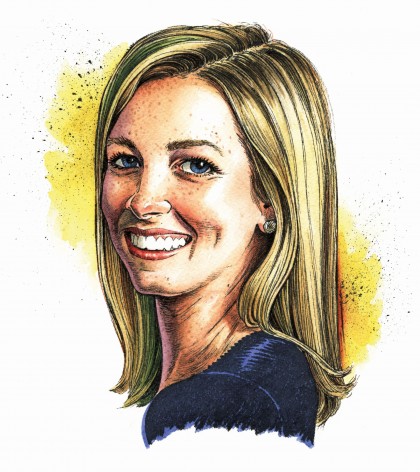
Image credit: John Kachik
Comedy writer Caitlin Kunkel once had a really great dog named Patches Kunkel. She says so on many of her online/social media bios. But even this dog lover couldn't believe that some of her fellow Portlandia residents were taking advantage of Oregon's service animal laws, which are intended to accommodate animals that provide therapeutic benefit to people with a mental or psychiatric disability. She says people "were just getting papers from their doctor so they could waive their apartment fees for their dog."
"I was like, 'You know what, that's really interesting that these people who are all so liberal and politically correct don't see anything wrong with abusing that law in order to not pay any deposits," she says. So she decided to poke fun at their rationalizations. Her "Emotions My Emotional Support Dog Supports" list was posted in April 2015 to Timothy McSweeney's Internet Tendency, the online portal of Dave Eggers' literary magazine, and addressed such debilitating mental issues as "slight rent increase rage," "other people's life decisions disgust," and "age-inappropriate wanderlust."
That healthy sardonic streak is what gives her writing and satire, which have appeared on the Huffington Post and the Second City Network, its spark. Kunkel, A&S '06, is a writer, director, producer, and teacher. She says that, like many 18-year-olds, she entered the Johns Hopkins Writing Seminars focused on dramatic stories. Classmates thought she was funny; she didn't believe them.
She found her way to satire through the usual channel—teaching English to 400 Indonesian high school students while on a Fulbright fellowship. "That was just such a strange experience that I started to see a lot of absurdity in that," Kunkel says. She began to write some comedy while there, and when she returned to the States she went to Northwestern University for graduate school and started taking sketch and satire classes at Second City. "I was like, 'Oh! This is what I have been looking for,'" she says.
Her satire blends a shrewd knowingness with ironic discomfort. Her "How to joke about Bill Cosby without offending anyone," posted in January 2015 on the Second City blog, mocked how-to listicles, the all-caps outrage of online moralism, and the everybody-is-a-unique-snowflake tone of advice columns. First suggestion: Word choice matters, so avoid "nonconsensual sex," "drugged drinks," and "disgraced icon." She writes: "We're trying to get a laugh here, NOT make people consider the fact that someone can be good at comedy AND ALSO a sexual predator."
Dan Ahdoot
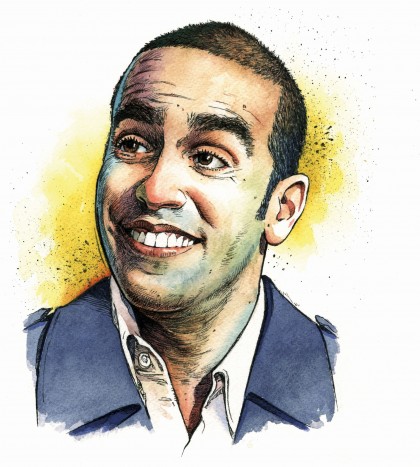
Image credit: John Kachik
Speaking by phone from Los Angeles, the comedian/actor Dan Ahdoot has a number of things to celebrate. He plays one of five "top" realtors on Bajillion Dollar Properties, a satire of reality shows like Million Dollar Listing that debuted on the streaming service Seeso in March; NBCUniversal has renewed it for another season. Ahdoot also sold a show to Fox based on his stand-up routines and life. But right now he wants to rewrite a joke he has just made; he's thinking about a better way to set up a punchline involving a production duty on a pornographic film set. "I don't know if that's too edgy, but I think it's pretty funny," Ahdoot says, and offers a better lead-in.
Hearing Ahdoot rewrite himself in real time opens a small window into his comedic mind, one forged through a decade of stand-up and a few years working in Los Angeles' acting and writing circles. Stand-up was what lured Ahdoot, A&S '00, away from the premed track and toward New York comedy clubs and college campuses. A standout set at Montreal's Just For Laughs festival in 2009 led to an appearance on The Tonight Show with Jay Leno and his move to Los Angeles for steady work writing, acting, and performing.
It's easy to understand what makes him appealing to mainstream entertainment. He's the telegenic nice guy who seems accessible and nonthreatening when he gets a bit risqué talking about meeting women, being a guy, and race. Born in Tehran to Jewish parents who emigrated to the United States, Ahdoot grew up in Great Neck, New York, one of two places in the country that has a sizable Persian Jewish community.
Everywhere else, he's a bit of a unicorn. "Being Iranian is outsider enough," Ahdoot says. "Throw Jew in the mix and you're completely on the outside—but you have a real front-row seat to be able to shine a light on life." In his early stand-up routines he often introduced his background by saying, "That's right, I'm an Iranian Jew, I was conceived in Narnia," before going on to toy with people's assumptions about Iranians. One story involves people coming up to him after his sets and asking if he's really Jewish or just saying that to hide the fact that he's Muslim; he wonders, "How much must it suck to be Muslim where people think you're faking being a Jew for your safety?"
For Ahdoot, "stand-up has always been my bread and butter, my base, my safe place," he says, adding that a decade on the road was good prep for Hollywood. Selling a show is basically doing a 15-minute stand-up pitch for executives. He's got that down. He's currently developing a show idea based on his friends, guys who—unlike him—continued into medicine. He's now the one nondoctor in the gang whenever they get together.
Working on this project might be why Ahdoot wanted to rewrite his punchline. When asked if he made the right decision to pursue comedy instead of medicine, he replies, "A million percent yes," and suggests the following zinger: "The way medicine is going now, even fluffers are looking back saying, 'Yeah, I made the right decision.'"
Hmm. That one might still need a bit of polish.
Jeff Altman
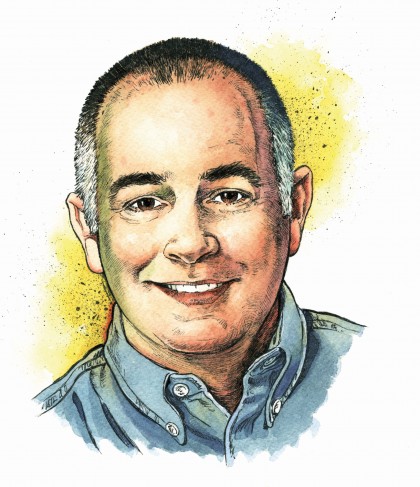
Image credit: John Kachik
Jeff Altman's official Screen Actors Guild résumé mentions that during his undergraduate days it wasn't uncommon to see him "being escorted out of the Hutzler Reading Room dressed as a bush." True story: He once stuffed his pants with leaves and foliage, entered the study haunt, and was promptly removed. He and a friend also had a late-night bit they'd do there. "I would start complaining very slowly, 'Too many courses,'" Altman, A&S '74, says, his voice becoming a whimpering whine. His friend would tell him to quiet down. After about 10 minutes Altman would erupt, "I can't do it anymore, I just can't"—and his friend would come around the table, rip off Altman's shirt, stuff it in his mouth, and pretend to tie him up. "I'd have to pretend to saw myself free," Altman says with a chuckle.
Perhaps it takes an overextended undergraduate to find this funny; any reasonable person, however, will wonder why somebody would do it in the first place. Altman's comedy is riven with such ridiculousness. His stand-up routines include impressions, characters, and physical comedy, but when filtered through his brain, they go a bit off. One Altman pratfall is presenting a National Safety Council announcement, smashing his head against something, and collapsing to the floor. A character he developed in the 1980s is a dad figure whose pants' waistline rises as he ages and "by the time he retired he had to pull down his zipper to drive." And one impression Altman did during a 2007 appearance on Late Show With David Letterman was Dick Cheney, in a bit about running into him in a restroom at the National Day of Prayer breakfast. The vice president enters a stall while Altman is washing his hands and, after a few minutes, begins complaining that there's no toilet paper. Altman does what any great American would do: "I turned off the lights and tiptoed out the door."
Altman is officially credited with more than 40 appearances on his friend Letterman's program, but he also had a role in a number of the show's signature bits. An Altman creation was often on the other end of the line whenever Letterman took a phone call, and one of those recurring characters was Lieutenant Len Easton of the California Highway Patrol. As Easton, Altman speaks in a clipped parody of law-enforcement radio chatter, and he comes across sounding like the cop who only takes off his aviator sunglasses to let a perp know he's really serious—even though he's phoning in utter nonsense. A typical radio call: "Partner Larry reports feelings of dizziness and hives. May be an allergy to the air conditioning. Will report to base. Request medical help, coffee, donuts, out."
Altman still does stand-up, and Johns Hopkins still finds its way into his act—a current routine involves getting an 8 on a calculus midterm—and he's impressed that he's not the only alum in the field anymore. "When I started doing comedy there were probably 300, 400 comics in the entire United States," he says. "Today if you walk into a Denny's and ask, 'Are there any comedians?' two people will stand up. The fact that you could name people immediately when I asked who else you were interviewing is just astounding to me. I find my own story kind of strange."
Liz Eldridge

Image credit: John Kachik
Lyda Southard was just another plain American girl from the plain American Midwest. Born north of Kansas City in the late 19th century, she moved with her husband and his brother to a ranch in Twin Falls, Idaho, in 1914, and had a daughter. Pretty soon her husband fell ill and died, followed by her brother-in-law. Lyda soldiered on, supported by the insurance money she collected. After her next three husbands—and her daughter—also took ill and died, and she collected their insurance claims, law enforcement began to sense something amiss. Sure enough, Lyda had poisoned them all, becoming one of America's first female serial killers, popularly remembered as Lyda Anna Mae Trueblood. When writer/performer Liz Eldridge, A&S '08, got a whiff of her story, she thought: darkly comic musical cabaret.
Southard served as the inspiration for Lydia Trueblood: The Black Widow of the Atlantic Coast, the performance piece Eldridge co-wrote, co-starred in, and produced in Los Angeles and the Edinburgh Fringe Festival in 2014. It's a two-actor/musician performance in which Eldridge plays the titular Lydia, a saloon owner who recounts her tale of husband slaying in a monologue peppered with songs. Eldridge's Lydia is joined by her near mute daughter Annabelle (Clara Dykstra), who provides instrumental accompaniment to Eldridge's ukulele and velvety voice. The songs move at a Tom Waits-ian bordello pace, though the subject matter, such as macabre odes to alcohol ("Thank God for Whisky"), gets twisted into the bleakly comic when performed on ukulele. When Eldridge performs the singsong ballad "Everybody Loves Me"—"talk about bleeding hearts/ there's a bouquet on my front step made out of body parts"—the effect is like Taylor Swift having a homicidally bad day.
Eldridge has a gift for such knowing musical comedy, able to write songs that flit between sincere musicality and outlandish performance. With her recently formed Los Angeles sketch comedy troupe Hot Garbage, Eldridge started making videos and posting them online, including a parody of Adele's "Hello From the Other Side." Titled "Hello From the 405," it's about being stuck in traffic on the overcrowded southern California highway. In it Eldridge sings into her cellphone, "I'm here Alameda dreaming/ about moving 40 feet to the off ramp, freedom," and the entire video achieves the kind of hilarious mirth mined by Our Hit Parade, New York's former underground series in which performance artists interpreted pop songs. Radio songs become funny, weird, theatrical, and an unusually entertaining vehicle for storytelling.
That unconventional mode fits what initially drew Eldridge to Southard in the first place. "We have this vision of the femme fatale or the black widow as a very glamorous, very beautiful woman who tricks men and draws them in," Eldridge says. "But Lyda's not a great beauty by any stretch. She's a very normal-looking lady, which I relate to, certainly. [And] the men she is marrying are these guys who [think], 'This is my second marriage, this lady seems normal, maybe she'll be a good stepmom for my kids.' And then she poisons them for the insurance money.
"I think that is so much scarier because it doesn't fit into our narrative of what an evil woman is," she continues, adding that she's currently working on a comedic cabaret piece inspired by Typhoid Mary. "I'm drawn to these sorts of characters, people who have to exist outside the constraints of society in order to find themselves."
Kurt Braunohler
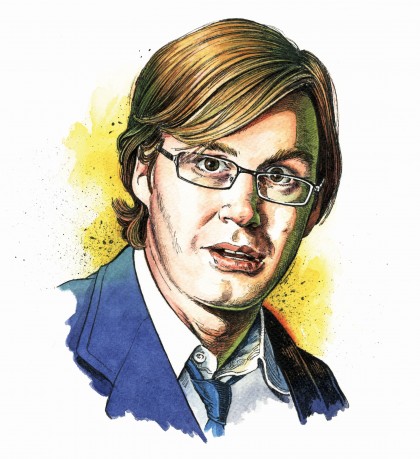
Image credit: John Kachik
One Jet Ski expedition = 500 goats + 1,000 chickens. This was the equation Kurt Braunohler devised in 2014 to raise money to send sustenance animals to impoverished African families. Stating on the crowdfunding site Indiegogo, "I might have figured out the dumbest way to make the world a better place," he launched a campaign to raise money for Heifer International, a nonprofit that provides livestock to people in the developing world. His pitch said, "I'll be jet-skiing from Chicago to New Orleans (seriously) in order to raise money to provide 500 goats and 1000 chickens for African families in need. I've got the jet-ski, I've got my route—I just need YOU to donate money so we can help change people's lives." He raised nearly $35,000 (all of which went to Heifer International), consulted experts on the best itinerary for Jet Skiing the Mississippi River, and on May 29, 2014, left Chicago with a small film crew and support vehicle, planning to make New Orleans by June 6 for a performance with his comedy partner, Kristen Schaal. He did stand-up performances at various stops en route. Comedy Central covered his expenses and filmed the trip for the web series Roustabout, which showed Braunohler tooling down the river wearing a wet suit done up as a tuxedo.
Such whimsically outlandish sincerity is the Los Angeles–based actor/comedian's sweet spot. In 2013, he raised money on Kickstarter to pay a skywriter to spell "How do I land?" in the air over downtown Los Angeles, a photo of which became the cover art for his comedy album that year. A stand-up routine about his first and last bar fight, which ostensibly took place during his college years in Baltimore, is a meandering tale involving a bad bar DJ named Jazze, spelling the word "douchebag" at the top of his lungs, and a clumsy sidewalk grappling session that ends with Braunohler and the DJ inside a phone booth trying to head butt each other but succeeding only in smashing their mouths together. "So I'm in a phone booth with a man who's named himself DJ Jazze," he says. "I'm bleeding onto him, it's my first bar fight, and I just kissed a dude."
Braunohler, A&S '98, got into comedy in the early 2000s in New York, a time when there was an overlap of indie rock and alternative comedy flitting through rock clubs and bars, and though he now maintains a steady mainstream career—this year alone, he co-stars in the third season of the Hulu comedy series Deadbeat alongside Tyler Labine and Kal Penn, stars as a disgraced investigative TV journalist trying to revive his career in B-Roll, and is shooting a stand-up special for Comedy Central in September—he still likes to keep a foot in the underground theaters and rock clubs where he forged his career. In Los Angeles, he and Schaal, a Daily Show alumna currently in the Fox comedy The Last Man on Earth, maintain their weekly variety show Hot Tub with Kurt and Kristen at a bar in Silver Lake. And he's 90 episodes into his semimonthly The K Ohle podcast, where he interviews fellow comedians, talks music, and in general tries out new material and ideas.
"You have to constantly be producing for free these days," Braunohler says. "It's good. It keeps you sharp. I think it has helped with joke writing, just constantly having to produce material. It keeps you more honest, I feel. You can't get lazy. If you are getting lazy, it's very obvious."
Posted in Arts+Culture, Alumni
Tagged alumni, social media, comedy, podcasts, viral videos




